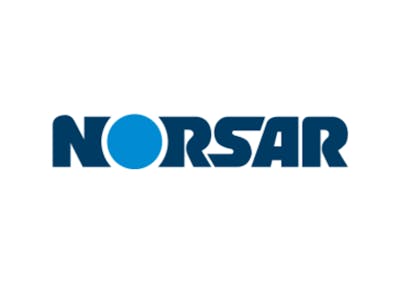- Norwegian institutes are in the lead in finding new solutions to batteries, hydrogen and solar energy
Anne Strømmen Lycke is the CEO of the Norwegian research institute NORSAR. Her institute's main goal is to listen to and monitor the Earth to create a safer society. The institute sector is doing research for the industry, and are at the very applied end of research projects. Anne has gathered some tips to investors looking to invest in the Norwegian institute sector's project and spin-off's.

Why should investors look to Norway?
– There’s quite a large cluster of institutes in Norway within the sector. In the area where our institute is located, there are more than a thousand people working to make the world a better place. Norway has a very interesting industry structure as we have quite a few large companies who do most of their research themselves, as well as a huge amount of small and medium businesses that are turning to us for competence.
In the Norwegian institute sector, we are doing research across the board and a large part of it is currently to find environmentally friendly solutions and green energy, and we are working to create a safer and greener society, including batteries, hydrogen, and solar energy.
Why is this the right time to invest in your sector?
– If you decide to invest in our sector, now is the time, because we still have the benefits from the wealth of the oil and gas industry and we are in the midst of implementing a green change with lots of new opportunities connected to new companies and new industry possibilities. We work closely with the European markets in the sense that we have several projects from the EU commission. We also collaborate with European and international partners, proving that we are actually are at the leading edge of the sector right now.
What are the trends in your sector right now?
– The trend right now is that we want to help the green movement and create a green change. One of our world’s biggest challenges is finding out how we can work, live and behave in an ecofriendly way and figure out new climate-friendly solutions both for the industry and for the energy supply. The Norwegian Government has launched quite a few research programs in order to facilitate the green shift and the sector is deeply engaged in that.
Many of the Norwegian institutes are in the lead when it comes to finding new solutions to batteries, hydrogen, solar energy, and so on. In that sense, it’s a very attractive sector to work for and to invest in.
Do you have any examples of success cases in your sector?
– There are some ideas within solar panels that are very interesting and about to become huge. The same goes for carbon capture and storage (CCS), where ZEG Power is the most popular within that sector right now (spin-off from IFE). Another interesting startup is Inherit Carbon Solutions, working with biogas CCS (working from StartupLab in Oslo).
We are also working hard on developing battery technology and my institute is working very closely with the government and industry partners on how to make CO₂ storage safely and to be assured that the CO₂ stays in place.
Why should investors keep an eye on the Oslo Region?
– With a wide background of new inventions and new possibilities that are going on in the Oslo area now, there’s a great opportunity to find small companies in the making, get in early, and make a good investment. We see that many of the institutes are working closely with the investment community in order to facilitate new workplaces and businesses.
Where can investors go to find more information about investment opportunities in your sector?
– As an investor, if you want to visit Oslo and see what is cooking I would visit the startup labs and the incubator communities as there are some really good ones both in and around Oslo. I especially recommend StartupLab at Oslo Science Park, Aggrator Inkubator at Ås University, and Kjeller Innovasjon.
There is a cluster for energy technology, focusing on batteries among other things, as well as a cluster for hydrogen and one for solar energy, all in Oslo and worth checking out.
Investment news and related companies to green tech
More information about investing in Oslo
CCS
- Carbon Capture Industries in Norway - Invest in Norway
- Why CCS in Norway? - CCS Norway
- Game-changing hydrogen production with integrated CO₂ capture - ZEG Power in the Explorer
- Carbon capture and storage - CCS, Ministry of Petroleum and Energy
Hydrogen
- The Hydrogen Cluster, based in Oslo, Norway
- Greening the industry with hydrogen - Invest in Norway
- Norway posied to lead green hydrogen market -The Explorer
- Meeting global demand for green hydrogen - The Explorer
- Fuelling the future with green hydrogen - The Explorer
Battery
- Norway: A battery superpower? The Explorer
- Battery Technology – a near-perfect, efficient, and circular ecosystem in Norway - Invest in Norway
- Building a circular battery economy in Norway - The Explorer
Solar Energy
- The Solar Energy Cluster - based in Oslo, Norway
- Solar energy shines in Norway - The Explorer
- Renewable energy flows through Norway - The Explorer
Interested in investing in green tech and innovation opportunities?
NORSAR - independent research foundation
Anne Strømmen's best advice for investors
NORSAR is an internationally recognized independent research foundation, specializing in seismology and seismic monitoring.
NORSAR's core competence lies within seismology and applied geophysics, and carries out research and consulting projects worldwide, based on these disciplines. As an extension of this work, they develop software solutions for both research and industry.
Assessing earthquake hazard and risk, monitoring seismic activity and rock slope stability, mapping the Earth's crust, and conducting weather and climate studies are also some of the R&D work NORSAR is capable of, and it has resulted in numerous important research findings and helped to develop new business areas.
If you are looking to do investment in a company in Norway focusing on the specialties of NORSAR, it is likely that NORSAR. Contact NORSAR and get connected with companies that are leading in their industry.
A research organization's role is to independently conduct fundamental research and/or applied research (industrial research and experimental development).
In Norway there are many institutes like NORSAR, see Norwegian Research Councils complete list.

Invest in businesses in Oslo
Some of the good reasons for doing business in Norway are the high level of education, high productivity, and a longstanding culture of innovation. Norway has one of the world’s strongest economies. High priority is given to knowledge development, innovation, technology, and while creating a sustainable and green business sector.
Norway is a world leader in the oil and gas, energy, maritime, and seafood sectors, but also offers sectors where they are creating innovative and groundbreaking solutions and services to solve the SDGs. Medtech, FinTech, Edtech, and other technology clusters are flourishing.
Find your next big investment success in the Oslo region.


